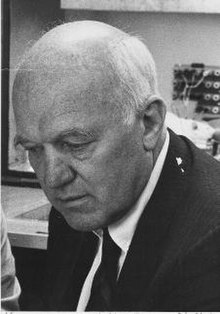Neal E. Miller | |
|---|---|
 | |
| Born | August 3, 1909 Milwaukee, Wisconsin, U.S. |
| Died | March 23, 2002 (aged 92) Hamden, Connecticut, U.S. |
| Nationality | American |
| Alma mater | University of Washington (BS) Stanford University (MS) Yale University (PhD) |
| Known for | Biofeedback, Frustration–aggression hypothesis |
| Awards | Newcomb Cleveland Prize (1956) APA Distinguished Scientific Contribution Award (1959)[1] National Medal of Science (1964) APA Award for Lifetime Contributions to Psychology (1991)[2] Wilbur Cross Medal (1967) |
| Scientific career | |
| Fields | Psychology |
| Institutions | Yale University Rockefeller University Cornell University Medical College |
Neal Elgar Miller (August 3, 1909 – March 23, 2002) was an American experimental psychologist.[3] Described as an energetic man with a variety of interests, including physics, biology and writing, Miller entered the field of psychology to pursue these.[4] With a background training in the sciences, he was inspired by professors and leading psychologists at the time to work on various areas in behavioral psychology and physiological psychology, specifically, relating visceral responses to behavior.
Miller's career in psychology started with research on "fear as a learned drive and its role in conflict".[5] Work in behavioral medicine led him to his most notable work on biofeedback.[4] Over his lifetime he lectured at Yale University, Rockefeller University, and Cornell University Medical College and was one of the youngest members of Yale's Institute of Human Relations. His accomplishments led to the establishment of two awards: the New Investigator Award from the Academy of Behavioral Medicine Research and an award for distinguished lectureship from the American Psychological Association.[5] A Review of General Psychology survey, published in 2002, ranked Miller as the eighth most cited psychologist of the 20th century.[6][7]
- ^ "APA Award for Distinguished Scientific Contributions". American Psychological Association. Retrieved 26 August 2015.
- ^ "Award for Lifetime Contributions to Psychology". American Psychological Association. Retrieved 26 August 2015.
- ^ Weiner, Irving B.; Craighead, W. Edward, eds. (2010). "Miller, Neal E. (1909–2002)". The Corsini encyclopedia of psychology. Vol. 3 (4th ed.). Hoboken, NJ: John Wiley & Sons. pp. 997–999. doi:10.1002/9780470479216.corpsy0547. ISBN 9780470170243. OCLC 429227903.
- ^ a b Cohen, David (1977). "Neal Miller". Psychologists on psychology. New York: Taplinger. pp. 240–261. ISBN 978-0800865573. OCLC 2644614. Reprinted as: Cohen, David (2015). "Neal Miller". Psychologists on psychology: classic edition. Routledge classic editions. New York: Routledge. pp. 191–207. ISBN 9781138808492. OCLC 881146290.
- ^ a b Mook, Douglas G. (2004). "Neal Miller". Classic experiments in psychology. Westport, CT: Greenwood Press. pp. 75–85. ISBN 978-0313318214. OCLC 56730032.
- ^ Haggbloom, Steven J.; Warnick, Renee; Warnick, Jason E.; Jones, Vinessa K.; Yarbrough, Gary L.; Russell, Tenea M.; Borecky, Chris M.; McGahhey, Reagan; Powell III, John L.; Beavers, Jamie (June 2002). "The 100 most eminent psychologists of the 20th century". Review of General Psychology. 6 (2): 139–152. CiteSeerX 10.1.1.586.1913. doi:10.1037/1089-2680.6.2.139. S2CID 145668721.
- ^ "Eminent psychologists of the 20th century". APA Monitor on Psychology. 33 (7): 29. July 2002. Retrieved 2014-11-07.